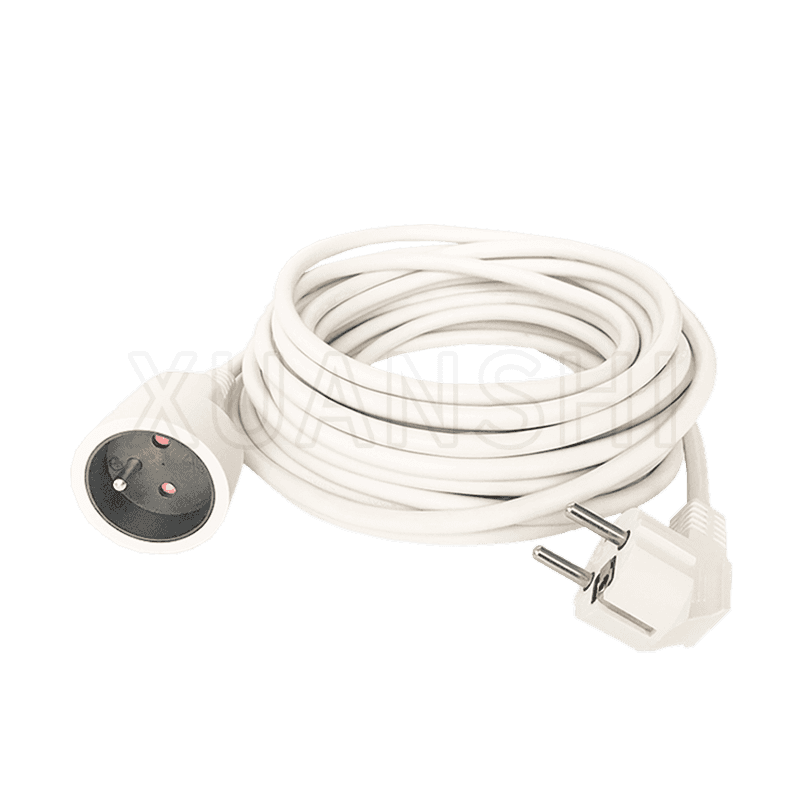Daisy-chaining socket power extension cords is generally not recommended due to safety concerns and potential risks of overload. However, if a situation arises where daisy-chaining seems necessary, it's crucial to adhere to specific guidelines. Here are some considerations:
Overloading Risk: Overloading in a daisy-chained extension cord scenario is a precarious situation where the aggregate current drawn surpasses the cord's rated capacity. This precarious circumstance escalates when power-hungry devices are simultaneously connected or when the overall load approaches the maximum capacity of the extension cord. The elevated current induces excessive heat, substantially heightening the probability of a thermal overload, leading to potential fire hazards and compromising the structural integrity of the extension cord itself.
Voltage Drop: Voltage drop, an inevitable consequence of increased resistance in the daisy-chained extension cord network, can have far-reaching implications. As the length of the extension cord chain extends, the voltage at the terminus diminishes, potentially impinging on the effective operation of connected devices, especially those sensitive to voltage fluctuations. This phenomenon underscores the importance of meticulous planning, where the total length of daisy-chained cords is calculated to mitigate the adverse effects of voltage drop and maintain consistent power delivery.
Cord Quality: The paramount significance of employing high-quality extension cords in a daisy chain cannot be overstated. Cords of inferior quality may lack the requisite insulation to shield against electrical hazards. Opting for substandard cords not only jeopardizes the overall safety of the daisy-chained setup but also undermines the extension cords' ability to withstand the rigors of extended use, potentially culminating in premature failure and compromising the reliability of the entire electrical system.
Intended Use: Deviating from the prescribed use and load capacities outlined by the manufacturer introduces a host of risks. The intricate design of extension cords caters to specific applications and usage scenarios. Straying beyond these parameters subjects the cords to stresses they were not engineered to withstand. Such deviations can manifest in accelerated wear, heightened thermal stress, and a general diminution of the extension cords' operational integrity, posing a latent threat to both the connected devices and the overall safety of the electrical system.
Safety Measures: The incorporation of additional safety features becomes a critical aspect of mitigating the inherent risks of daisy-chaining. Power strips endowed with surge protection and overload prevention mechanisms serve as formidable bulwarks against transient voltage spikes and excessive current, respectively. The integration of such safety measures not only fortifies the protection afforded to connected devices but also acts as a preemptive measure to curtail potential electrical hazards that may arise from unforeseen circumstances.
Outdoor Use: Extending the use of extension cords into outdoor environments necessitates an acute awareness of the environmental challenges they may face. Outdoor-specific extension cords, fortified with weather-resistant materials and construction, become indispensable in ensuring the longevity and safety of the setup. Failure to employ cords expressly designed for outdoor use exposes the system to the corrosive effects of the elements, potentially leading to compromised insulation, electrical failures, and heightened safety risks.
Heavy-Duty Applications: In scenarios demanding the resilience to prolonged and demanding use, the selection of extension cords tailored for heavy-duty applications becomes imperative. These cords, often characterized by reinforced construction and enhanced insulation, exhibit the fortitude necessary to withstand the rigors of industrial or intensive usage. By opting for heavy-duty extension cords, one not only ensures the longevity of the setup but also mitigates potential safety hazards associated with the stress of continuous operation.
NF Approved French Type Indoor Power Extension Cord JL-3,JL-3A
